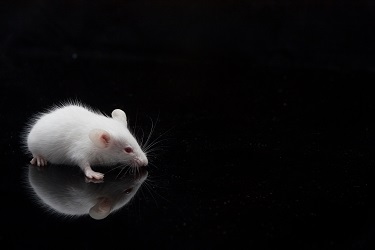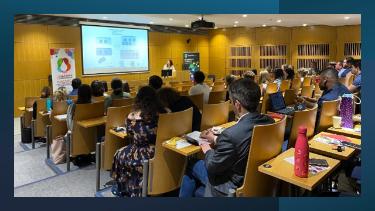David Gomez Matallanas Named Assistant Professor, Awarded Ad Astra Fellowship
Now celebrating his tenth year at SBI, Group Leader David Gomez Matallanas has just been named an assistant professor and Ad Astra fellow at UCD. He reflects on the last decade as he looks forward to the future in the following Q&A.
1. What is your hometown?
I am from Madrid, Spain. Although I feel very Madrilenian, I also consider myself at home in Santander and Glasgow where I used to live, and of course in Dublin.
2. Tell me a little bit about your SBI journey - how many years have you been here, and what have your different roles been?
I am the longest serving member of SBI. This September is 10 years since I moved over from Glasgow to do a second postdoc. The idea was to do a short stay and then move elsewhere. Together with Marc Birtwistle and SBI alumni we moved the lab equipment via ferry to our first lab in UCD. I really have seen the institute grow and moved from lab to lab until we got the SBI building. I was a little bit skeptical about the systems biology field, but after a year or so I started to see what this new field was really about and got interested in developing my career in that direction. I have been lucky to be part of many multidisciplinary flag projects of SBI and have moved quite a lot from my original training as experimental biologist by incorporating more and more computational approaches into my research. That is why when the opportunity came to start my own group as a research fellow/PI in SBI I decided to stay here. That was in 2011 and next year I start a new position as Assistant professor with an Ad Astra fellowship.
3. So, for those who may not know what the Ad Astra fellowship is, what does this mean for your group and your own career?
This is part of a programme to recruit new lecturers to UCD with a competitive research profile. At a personal level, it means a step up in my professional ladder and I will become a member of the School of Medicine faculty. This fellowship will sponsor a new PhD student and help me consolidate my group. It also means that I will get more involved in teaching and I am looking forward to this new challenge and in particular to help creating new programmes that increase the education of UCD students in the field of Systems Biology. As a biologist that has learned about this field on the go I really think that acquiring skills in systems biology is necessary for the new generation of biomedicine professionals and therefore with this fellowship I can work towards this end.
4. What is your group working on at the moment?
Currently my group is 4 researches who work on three projects. Although the topics may seem a little bit diverse, all of them focus on understanding how molecular networks are organised and determine different biological functions. Lucía and Stephanie are funded by a Career Development Award from SFI that focuses on the study of a protein called LATS1 in metastatic melanoma. This protein is part of the machinery that makes sure that the cell dies when it has to die and we have seen that is not working properly in skin cancer cells. So, we are trying to understand what is going wrong and if we can find ways to revert things to normal and this way kill the tumour’s cell. Aoife works in COLOSSUS, an EU funded project where we are trying to characterise a subgroup of colorectal cancer patients for which we do not have effective treatments at the moment. We are using a technique called proteomics that allows us to identify the proteins that are in the tumour of a specific patient. With this information and other data from our partners, we aim to understand what is wrong in each of the patients. With this information, we try to create new ways of treating these patients. In the consortium we generate a lot of data, and in order to make sense of these we use computers to generate mathematical models that can reproduce what is happening in the patients. This is similar to the way they do the models for the weather forecast but instead of using the speed of wind or atmospheric pressure we use protein and gene information. The third project that is very advanced is SmartNanoTox. Here we also develop computational models using information from our experiments, but in this case, we focus on the study of nanoparticles. Nanoparticles are everywhere these days and some of them are toxic. For this reason, we need to test these materials toxicity which requires a lot of experiments, time and money. In our part of the project, which is performed by Hilary, we are trying to know the molecules that bind to the nanoparticles and how this may result in a toxic reaction. With this information and data from other partners we are creating the computational models that in this case will help to perform toxicology tests in the computer in a faster, cheaper and safer way.
5. That is three projects, but you said you have four on the go.
Yes, the new project has just started on September 1, 2019, and I need to recruit a new postdoctoral researcher. It is funded by the EU and is called 3TR (Taxonomy, Treatment, Targets and Remission). This project moves from the cancer field but will apply what we learned in this disease to other diseases. In particular, it will focus on the identification of the molecular mechanisms of non-response to treatments, relapses and remission in autoimmune, inflammatory, and allergic conditions. In this case we will be involved mainly in the computational side and help developing new approaches for the integration of the data generated by other partners. This is a very exciting project where we will apply machine learning/artificial intelligence and we will work with clinicians, other basic researchers and pharma companies. There is still a lot of work to be done in the coming years, but I am looking forward to new opportunities.

